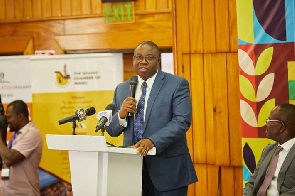The Ghana Chamber of Mines (GCM) has reiterated the need for exploration companies to be exempted from the payment of Value-Added Tax (VAT) on drilling and laboratories.
That, the President of the GCM, Mr Joshua Mortoti, said, would help attract exploration capital to the country’s mining industry.
Addressing the 95th annual general meeting of the GCM as part of the 2023 and 5th Mining and Energy Summit in Accra at the weekend, he said exploration investment in Ghana had declined significantly in recent years.
“This is alarming for a country where mining is critical for forex and fiscal revenue generation,” he stated.
Mr Mortoti said VAT was payable on exploration expenditure, and could not be recovered by the exploration companies unless they made commercial find and started production.
“This implies that where exploration was unsuccessful, VAT would not be recoverable. Effectively, the extent of actual exploration activity is diminished upfront cost such as VAT on inputs. Thus, relieving the usually illiquid exploration companies from the payment of VAT would not only improve their cash flow situation and reduce their operation costs, but also enhance the country’s image as a competitive destination for exploration investment,” he stressed.
Mr Mortoti said some resource-rich countries, such as South Africa, were pursuing initiatives to ensure fresh inflows to revitalise exploration investment, and Ghana should pursue same, saying in the long run, that would guarantee continuous mineral production and flow of fiscal and forex receipts as well as other benefits from the minerals sector.
The President of the GCM mentioned a number of fiscal issues, such as the Imposition of Growth and Sustainability Levy, Price Stabilisation and Recovery Levy, and Energy Debt Recovery Levy.
These fiscal policies would further increase the already high cost of production and cash inflows for the mining companies.
Highlighting the mineral production and export for the country, Mr Mortoti said the country’s main minerals recorded mixed performances in 2022.
He said while gold and diamond output increased, the production of bulk minerals, and bauxite declined year-on-year.
“The country’s gold output, thankfully, increased from 2.8 million ounces to 3.7 million ounces in 2022, due to concurrent growth in the output of both large and small-scale sectors. This translates into a 32 per cent increase in production in the gold sub-sector,” he stated.
Business News of Thursday, 15 June 2023
Source: ghanaiantimes.com.gh

















